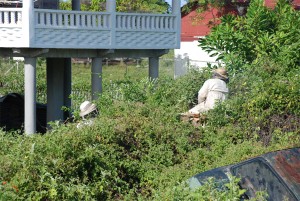A number of children from Paradise, East Coast Demerara were treated at the Georgetown Public Hospital after they were stung by bees yesterday morning.

The swarm of bees, whose hive was in an old car, launched an attack on some 15 persons after they were disturbed by the vibrations from construction work being done a short distance away.
When Stabroek News visited the Paradise area yesterday afternoon apiculturist Lindon Stewart and his team were already making efforts to remove the bees, believed to be of the Africanised strain.
According to a resident, Mr. Nelson, several workers were in his yard doing some construction work when the bees appeared and began to attack the workers and several children who were in his yard.
Mr. Nelson said that in an effort to get rid of the bees he had to stand the expense of paying for their removal by Stewart.
“There are two other hives in close proximity to this one,” the man said, “I have to pay for those to be removed as well.”
“I do not live here,” Mr. Nelson explained, “but I am here every year and last year I had complained to the Regional Democratic Council’s Chairman Clement Corlette but nothing has been done about the bees from then to now.”
Nelson told Stabroek News that the car in which the hive was located was one of many old cars a resident kept in the empty lot. The man said that many times he has had the area cleared of the bush to avoid the bees making their home there. However, he said, it is hard to clear the bush with the many old cars crowding the area.
One of the construction workers, who was stung four times on his head, told this newspaper that they were working when the bees “suddenly attacked.” He said that he and the others had to run to the other corner to escape the bees.
However, the man related that no one was seriously hurt by the bees.
A group of women who lived in the house across the road from the hive said that one of the men ran into their yard in an effort to escape the bees. “We had to run in de house and lock up,” one of the women said. She further said that this was not the first time that the bees had attacked.
Stewart told this newspaper that the bees were just like fire: “they are good servants but bad masters,” he said. The apiculturist said that the bees are to be removed but not terminated since they are important to the environment. He pointed out that the bees aided in pollination and would not harm anyone unless they felt threatened.
Bees, he said, are threatened by certain smells and vibrations.
He explained that the disturbance caused by the construction work would have caused the bees to become agitated and to attack. Smoke was used to trick the bees, Stewart further said, causing them to think that fire was in the area and they would then consume their honey to get energy to fly far off.
The honey, the apiculturist explained, “intoxicated” the bees and made it easier for him and his team to penetrate the hive to get to the queen. (Sara Bharrat)




